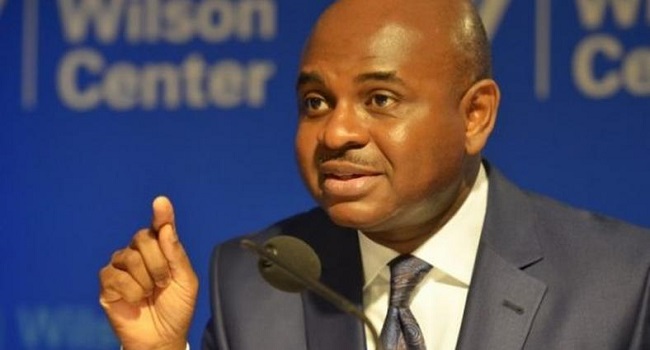News
Time for far-reaching restructuring of Nigeria’s economy —Moghalu

A former Deputy Governor of Central Bank of Nigeria, Kingsley Moghalu, Friday charged the Federal Government to commence a far-reaching restructuring and repositioning of Nigeria’s economy.
Moghalu, who was the Young Progressives Party (YPP) presidential candidate in the 2019 election, in a statement titled: “Nigeria’s COVID-19, Oil Price Crash and Fiscal Crisis Calls for a More Fundamental Response”, identified the country’s extreme reliance on oil for revenues, lack of fiscal savings, and unwillingness to cut the bloated costs of governance and restructure Nigeria constitutionally to make the economy more productive as some of its fundamental problems.
He said the country’s problems would not be solved by borrowing for the balance of payments.
Moghalu said: “I make this suggestion based on my strong view that our 100 million countrymen and women who live in extreme poverty, giving us the title of ‘poverty capital of the world’ are not poor because we lack intelligent economists. Nigerians are impoverished by their country’s politics, politicians, and by its unworkable constitutional structure which creates perverse incentives that ensure the country is locked into the resource curse of oil.
“The federal government of Nigeria borrowing $3.4 billion from the International Monetary Fund under the Fund’s Rapid Financing Instrument program and seeking another $3.5 from the World Bank and the African Development Bank without structural economic and constitutional reforms, in an age of declining oil revenues, is to postpone the evil day. Our country’s moment of reckoning has arrived.”
“We need more than $7 billion to solve the balance of payments challenge, but that is not the point. If, as is likely, oil prices remain low for some time, this is just bandaid. With these loans, our reserves position may improve temporarily. Central Bank of Nigeria will restart intervention to create artificial strength for the naira, and those who don’t understand the fundamentals of economic transformation will think we have overcome our problems.
“We also need to be mindful of a further implication of the many loans our federal government seeks to take: borrowing so much without a real source of revenue to repay will likely result in a sovereign debt crisis. While we are told that our ratio of debt to our GDP is a moderate 21 percent, the more relevant ratio is that of revenue to debt servicing which in the region of 60 percent or more.
READ ALSO: No employer should retrench workers without due process ―Buhari
“This means simply, that nearly two-thirds of our country’s revenues go to debt servicing. Nigeria is entering a dangerously vicious cycle.
“We need to re-incentivize the economy to be productive. The surest way to do so after the COVID-19 crisis subsides is to wean ourselves of oil dependence by commencing a constitutional restructuring that devolves far more powers to regions (not states, many of which are not viable on their own) so they can make use of the economies of scale to create viable regional economies.”
Join the conversation
Support Ripples Nigeria, hold up solutions journalism
Balanced, fearless journalism driven by data comes at huge financial costs.
As a media platform, we hold leadership accountable and will not trade the right to press freedom and free speech for a piece of cake.
If you like what we do, and are ready to uphold solutions journalism, kindly donate to the Ripples Nigeria cause.
Your support would help to ensure that citizens and institutions continue to have free access to credible and reliable information for societal development.
























